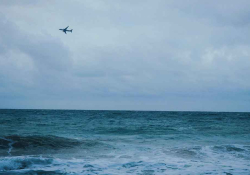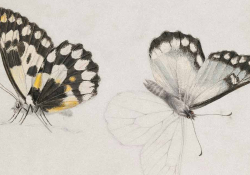Three Poems

Merchant Ships
And then they are fleets
wakes,
excesses
of ships in the night.
Among swells of mist
set loose
by the mouth of the abyss,
a steel flock
rattles
in the wind and is off
splitting the dense liquid in two.
It’s propelled by the containers
shaking from the containers
singing and roaring from the
honey seeping out of the containers.
They are the postapocalyptic horns
that wade through until they bite at the ports
creaking when at worship and war
before the new flesh forms:
sheds smelling
of imaginary bread.
Egg cartons
where a plastic chicken
is born
with true animal
effort.
Pig farms
to feed pigs.
Eight hundred million egg shells
and vessels
asleep in the middle of vessels.
As for
the merchant women,
they are opening trunks
looking for earrings
made of stone,
glass
pressed to
plastic,
and as they go
they toss aside
apple cartons
that don’t know the goodness
of going bad for nobody.
On the docks
before the day’s cargo
we squander the ancient custom
of offering up terror and wonder
to what comes by sea.
Señorita
We’ve got too much
of that (endless) reserve
of what wasn’t made to last.
Your shiniest tiny stone,
a Chinatown swindle.
Think about this,
girl,
in the prairies of Taobao
lust is that thing shooting up
the side of the name,
and everything that smells like
Chanel 11.12
is air
and everything that reeks of Gucci
and Prada on skin
is air
and the shred of silk on the edge is
shine, as it covers you up it undresses you,
air.
And still,
I’m a shepherd of this acclaimed
abundance:
your gesture
to take it all away,
but not
the tiny stone of polished metal,
shining on the side that’s worth nothing
but means something,
it’s our endless reserve
of what isn’t meant to last.
Leisure
Since everyone has had that feeling
when eating Chinese
or will
sooner or later.
Since there are ridiculous,
sad,
ways of abandonment
and one,
no less sad,
sensation of coming to an end,
here
where nothing
seems thrilling any more:
lobsters jammed in tiny
fish tanks,
trains of people pushing ahead
without the elegance of the Japanese
and so many other fallouts
preceded
by forms of overcrowding.
Since anyone who grew up
in a market
knows that there are unusable things
three or four in the afternoon
and clocks from a time
that only gets by as an enemy,
and an hour when they drop
onto the counter:
sun
heat
and nonsense,
here,
where ginger stalks,
like freakish molars,
and a giant pumpkin,
exposed to anything,
warn that something’s about to happen.
But no.
Since the street is full of folks
looking for exotic
fruit,
folks who can leave it all behind
but nothing
empty,
people who wander around
and trample time
like dry leaves.
But in the midday line
eight hundred million Chinese
dream different dreams
and in between the cracks
– believe it or not –
a girl
sleeps
without burden.
If someone finds out,
there’s a chance
they’ll wake her up.
We know that leisure is the mother of
all greed.
Translations from the Spanish












